Filter by
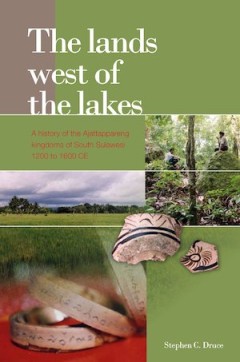
The lands west of the lakes : A history of the Ajattappareng kingdoms of So…
The period 1200-1600 CE saw a radical transformation from simple chiefdoms to kingdoms (in archaeological terminology, complex chiefdoms) across lowland South Sulawesi, a region that lay outside the ‘classical’ Indicized parts of Southeast Asia. The rise of these kingdoms was stimulated and economically supported by trade in prestige goods with other parts of island Southeast Asia, yet the …
- Edition
- -
- ISBN/ISSN
- 978 90 6718 331 4
- Collation
- -
- Series Title
- -
- Call Number
- 352.23 DRU l

National Museums and Nation-building in Europe 1750-2010 {Mobilization and le…
Europe’s national museums have since their creation been at the centre of on-going nation making processes. National museums negotiate conflicts and contradictions and entrain the community sufficiently to obtain the support of scientists and art connoisseurs, citizens and taxpayers, policy makers, domestic and foreign visitors alike. National Museums and Nation-building in Europe 1750-2010 a…
- Edition
- -
- ISBN/ISSN
- 9781317569145
- Collation
- -
- Series Title
- -
- Call Number
- 300
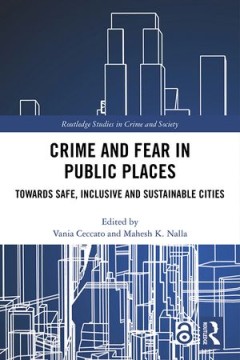
'Crime and Fear in Public Places: Towards Safe, Inclusive and Sustainable Cities
The Open Access version of this book, available at https://www.taylorfrancis.com/books/9780429352775 has been made available under a Creative Commons Attribution-Non Commercial-No Derivatives 4.0 license. No city environment reflects the meaning of urban life better than a public place. A public place, whatever its nature—a park, a mall, a train platform or a street corner—is where people p…
- Edition
- -
- ISBN/ISSN
- 1000097943
- Collation
- -
- Series Title
- -
- Call Number
- 300
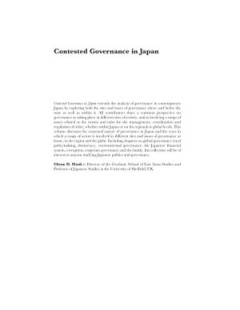
Contested Governance in Japan
Contested Governance in Japan extends the analysis of governance in contemporary Japan by exploring both the sites and issues of governance above and below the state as well as within it. This volume discusses the contested nature of governance in Japan and the ways in which a range of actors are involved in different sites and issues of governance at home, in the region and the globe. It inclu…
- Edition
- -
- ISBN/ISSN
- 9780203015384
- Collation
- -
- Series Title
- -
- Call Number
- 300
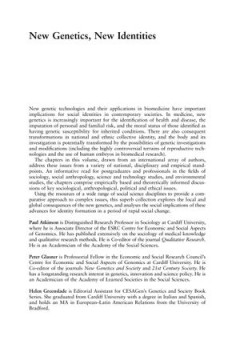
New Genetics, New Identities
What implications are applications of new genetic technologies in biomedicine having on social identity in today’s society? New Genetics, New Identities, a wide-ranging multi-disciplinary volume in the CESAGen Genetics & Society Book series, presents not only theoretical reflection but also empirical case studies drawn from an international array of authors. Including the highly controversial…
- Edition
- -
- ISBN/ISSN
- 9780203962923
- Collation
- -
- Series Title
- -
- Call Number
- 300
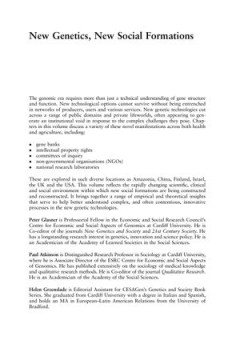
New Genetics, New Social Formations
New genetic technologies cut across a range of public regulatory domains and private lifeworlds, often appearing to generate an institutional void in response to the complex challenges they pose. As a result, a number of new social formations are being developed to legitimate public engagement and avoid the perceived democratic deficit that may result. Papers in this volume discuss a variety of…
- Edition
- -
- ISBN/ISSN
- 9780203962893
- Collation
- -
- Series Title
- -
- Call Number
- 300
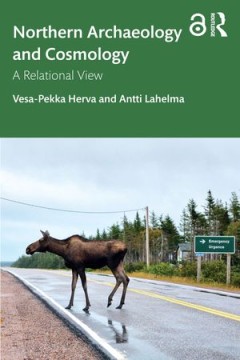
Northern Archaeology and Cosmology: A Relational View
In its analysis of the archaeologies and histories of the northern fringe of Europe, this book provides a focus on animistic–shamanistic cosmologies and the associated human–environment relations from the Neolithic to modern times. The North has fascinated Europeans throughout history, as an enchanted world of natural and supernatural marvels: a land of light and dark, of northern lights an…
- Edition
- -
- ISBN/ISSN
- 0429783515
- Collation
- -
- Series Title
- -
- Call Number
- 300
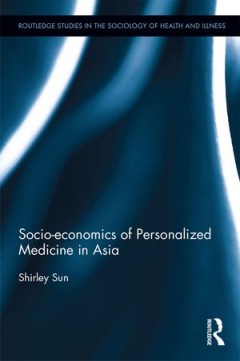
Socio-economics of Personalized Medicine in Asia
The second decade of the twenty-first century has witnessed a surging interest in personalized medicine with the concomitant promise to enable more precise diagnosis and treatment of disease and illness, based upon an individual’s unique genetic makeup.In this book, my goal is to contribute to a growing body of literature on personalized medicine by tracing and analyzing how this field has bl…
- Edition
- -
- ISBN/ISSN
- 9781134989126
- Collation
- -
- Series Title
- -
- Call Number
- 301 SUN s
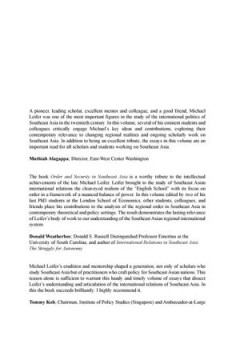
Order and Security in Southeast Asia
Michael Leifer, who died in 2001, was one of the leading scholars of Southeast Asian international relations. He was hugely influential through his extensive writings and his contacts with people in government and business in the region. In this book, many of Leifer’s students, colleagues and friends come together to explore the key themes of his work on Southeast Asia, including the notion o…
- Edition
- -
- ISBN/ISSN
- 9780203014813
- Collation
- -
- Series Title
- -
- Call Number
- 300
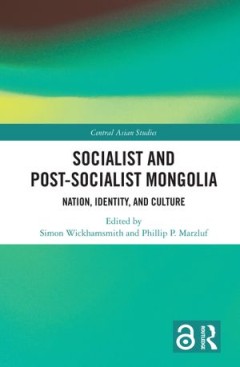
Socialist and Post–Socialist Mongolia: Nation, Identity, and Culture
This book re-examines the origins of modern Mongolian nationalism, discussing nation building as sponsored by the socialist Mongolian People’s Revolutionary Party and the Soviet Union and emphasizing in particular the role of the arts and the humanities. It considers the politics and society of the early revolutionary period and assesses the ways in which ideas about nationhood were construct…
- Edition
- -
- ISBN/ISSN
- 9781000337150
- Collation
- -
- Series Title
- -
- Call Number
- 305.8 SOC s
 Computer Science, Information & General Works
Computer Science, Information & General Works  Philosophy & Psychology
Philosophy & Psychology  Religion
Religion  Social Sciences
Social Sciences  Language
Language  Pure Science
Pure Science  Applied Sciences
Applied Sciences  Art & Recreation
Art & Recreation  Literature
Literature  History & Geography
History & Geography